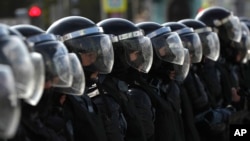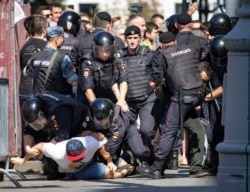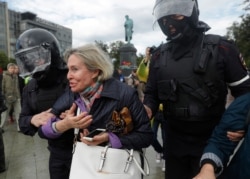This story originated in VOA's Russian Service.
WASHINGTON — It was just hours after Russian President Vladimir Putin's May 2018 inauguration that the footage appeared online: a coterie of men clad in unmarked military garb chasing down and beating anti-Kremlin protesters as riot police passively looked on.
Two young rights advocates, a journalism student named Victor Oleynik and a data analyst, Anton Gromov, had had enough. Loading the footage to encrypted instant messaging app Telegram, the pair implored their followers to crowdsource identities of the assailants, a rag-tag band of self-proclaimed Cossacks who delivered the beatings with impunity.
The two then published a list of names and photographs identifying the vigilantes on a site called bewareofthem.org, which has since grown into a fully indexed user-generated database that tracks everyone from corrupt election commissioners to violent thugs, riot cops and secret police officers who are recorded beating pro-democracy demonstrators across Russia.
By cataloging each image by name, profession or organizational affiliation, Oleynik—who, like Gromov, has since moved abroad after being declared an "enemy of the state"— is creating an official record of crimes committed against Russian nationals for practicing their constitutionally protected right to peaceful protest.
Latest rallies a tipping point
New footage of increasingly brutal beatings by the state security forces has proliferated amid recent street protests over municipal elections in Moscow, slated for Sept. 8.
Over the past few weeks, thousands have been detained at rallies for free and fair elections after Moscow’s electoral commission, which is designed to impartially administer the elections, disqualified the majority of opposition candidates from seeking office.
Nearly 1,400 protesters were taken into custody on July 27 alone.
Developing the database from abroad, Oleynik and Gromov are creating an internationally accessible portal that holds everyone from random vigilantes to riot police and election officials individually accountable for the beatings.
Oleynik told VOA's Russian Service that they've divided their workload.
Oleynik is tasked primarily with identifying corrupt elections officials whom he, like the thousands of demonstrators on the streets, accuses of forging nominee petitions and tampering with voter registration documents.
"Dozens of independent candidates for Moscow City Duma are deprived of the opportunity to participate in the elections due to the actions of these individual election commission officials and 'experts' from the Ministry of Interior," the 22-year-old Oleynik said.
The Moscow City Duma is Russia's unicameral regional legislative body that makes laws and handles the budget for the capital city's estimated 12 million inhabitants.
As prominent Russian rights activist Vladimir Kara-Murza recently wrote in The Washington Post, most disqualifying petition irregularities are "created by the commissions themselves, whose official experts invalidated signatures by deliberately adding misprints to names or identity document numbers when cross-checking them against police databases."
Moscow city electoral commissioners, appointed by the legislative body's ruling pro-Kremlin party have, deny that charge.
"Despite the fact that these people act on the orders of their bosses, this does not relieve them from responsibility for the crimes they've committed," he said. "Honest people among members of the commissions are the minority."
Oleynik also said data collected by his group is vetted for accuracy before being submitted to Russian law enforcement agencies.
"If Russian authorities reject the request for an investigation, the information is then transferred to the U.S. Congress and European Union officials," he said, adding that a measure known as the Magnitsky Act allows international courts to freeze assets and ban visas of foreign officials responsible for human rights violations in their home countries.
"Currently, the people remain unpunished both at home and abroad, where they can safely deposit money, travel, and use other benefits of the Western world," Oleynik said. "This is at least unfair to those people who are trying to change Russia for the better, because they're typically on the brink of survival."
Expanding range of profiles
Gromov, founder of the pro-Western nonprofit Eurorussians.com, is focused almost exclusively on identifying abuses of authority by police, particularly officers caught on video using excessive force.
"We aim to hold officers personally responsible, as well as those who order the crackdown on peaceful protests," said Gromov, who now resides in Riga, Latvia.
Their efforts at holding individuals accountable have not gone unrecognized. Last year, responding to footage of the Putin inauguration beatings in Pushkin Square, the self-identified Cossacks issued a vendetta vowing to hunt down founders of the site and pro-democracy activists who support it — and not just in Russia.
"We will seek you abroad, too," said the open letter from the pro-Kremlin vigilantes. "We will use our official position to find each of you and mete out the punishment ourselves."
Just last month, Moscow-based NTV news published an appeal to the "organizers of local protests in Moscow," which was signed by a consortium of municipal police and state security officials who accuse demonstrators of working on behalf of foreign governments, such as the United States and Germany.
Earlier this week, Russia's Interior Ministry said police detained 600 people at an unsanctioned protest and that some demonstrators are facing criminal investigations.
A number of independent candidates have been placed under arrest for up to 30 days.


